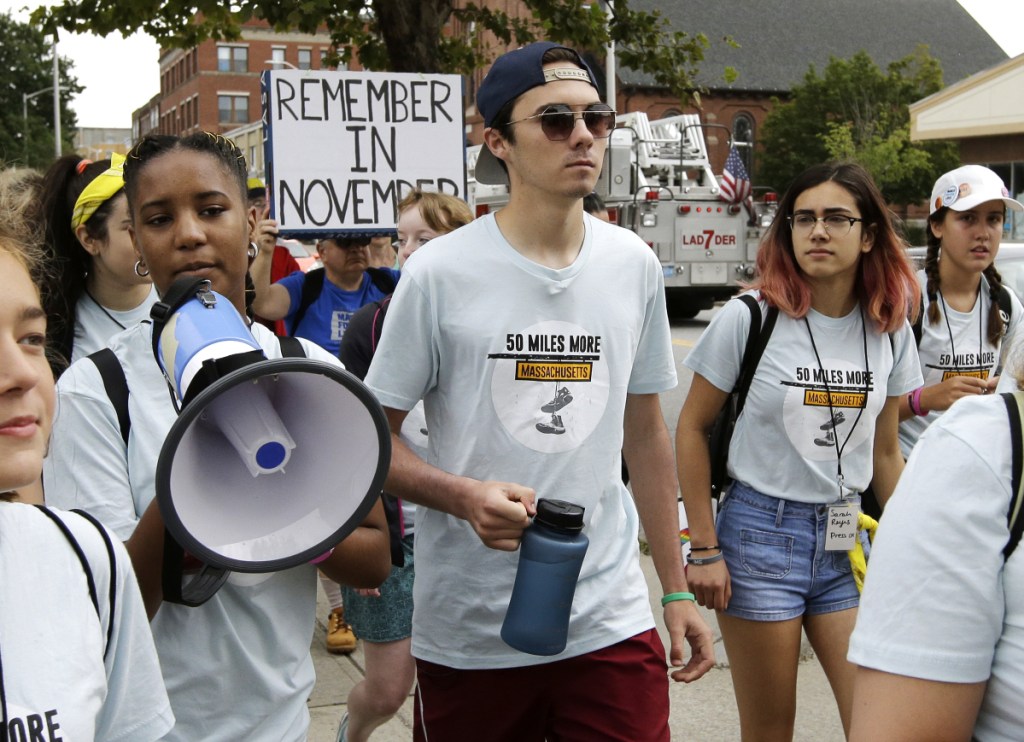I’ve been out and about this campaign season driving Maine House and Senate candidates around to knock on doors and meet the voters. I’ve noted a discouraging comment made frequently by candidates that young people seem very disengaged and many see no point in voting. And yet there is so much in the public policy arena that affects young people: the rising cost of college and crushing student debt, high unemployment rates among youth, spotty broadband and cellphone access, renewable energy, unaffordable housing and saturated rental markets, and more. Seems like a terrible time to sit it out.
Maine has long been known as a high voter turnout state. In fact, in the 2014 midterm elections, we ranked No. 1 in voting percentage by far: 59.3 percent in Maine versus 36.6 percent nationally. Our rates were undoubtedly bumped up by a contentious gubernatorial election and some controversial referenda.
Well, here we are again in the 2018 midterm elections with a gubernatorial race that appears to be quite close. What can we expect from our young voters — the millennials — in this election? They are now in the driver’s seat as they will likely surpass baby boomers as the largest adult population in 2019.
Recent national polls and prognostications have indicated that younger voters are not likely to vote in these midterms: 26 percent of young Americans (ages 18-29) are absolutely certain they will vote, compared to 82 percent of seniors (2018 Gallup poll). Perhaps they do not see the importance of midterm elections. Perhaps they feel their issues are being ignored. There is no denying, however, that millennials can have an impact, being the deciding voting demographic in a number of key states during Barack Obama’s second presidential election.
This demographic shift, however, scares some politicians. Right next door in New Hampshire, the General Assembly introduced several bills in 2017 that would effectively suppress ballot access for young voters, particularly those in college. These are likely in response to President Donald Trump’s claim that there was rampant voter fraud in the 2016 national elections. His own now-disbanded Presidential Advisory Commission on Election Integrity published no evidence to support this claim.
We’ve had our own accusations about voter fraud among college students in Maine, which were settled through an investigation by a Republican secretary of state in 2011. He found no evidence of fraud. The Heritage Foundation, a conservative think tank, maintains a website of voter fraud cases, state by state. Over all these years of accusations, only two cases, dating back to 2010, are listed for Maine, with one person convicted.
Voter fraud and voter suppression appear to be the last vestiges of older politicians trying desperately to secure control of the political system from insurgent youth.
So what impact will millennial voters have on Maine elections in 2018? Our gubernatorial elections unfortunately fall into the national midterm election cycles that seem so uninteresting to these young voters. On the positive side, there are young candidates in our two national races and bright young faces running in House and Senate races up and down the state. Will they succeed in drawing young voters out?
Polls have shown this to be a very tight gubernatorial race among likely Maine voters (whom, we now know, will be older). If candidates were smart, they’d see the opportunity that the big marginal voting block of young adults provides. Conversely, young voters should listen carefully to the gubernatorial debates. The candidates — Democrat Janet Mills, Republican Shawn Moody, and independent Terry Hayes — are sparring over your issues: clean energy, climate change, health care and student debt.
What a terrific opportunity this election poses for young voters. It’s an opportunity for them to show up, make a difference, push a candidate over the finish line, and demand that their issues are front and center in the next administration.
For if you persist in sitting on the sidelines this election cycle, you will once again allow older voters to decide your future.
Lisa Miller, of Somerville, is a former legislator who served on the Health and Human Services and Appropriations and Financial Affairs committees.
Copy the Story LinkSend questions/comments to the editors.



Success. Please wait for the page to reload. If the page does not reload within 5 seconds, please refresh the page.
Enter your email and password to access comments.
Hi, to comment on stories you must . This profile is in addition to your subscription and website login.
Already have a commenting profile? .
Invalid username/password.
Please check your email to confirm and complete your registration.
Only subscribers are eligible to post comments. Please subscribe or login first for digital access. Here’s why.
Use the form below to reset your password. When you've submitted your account email, we will send an email with a reset code.